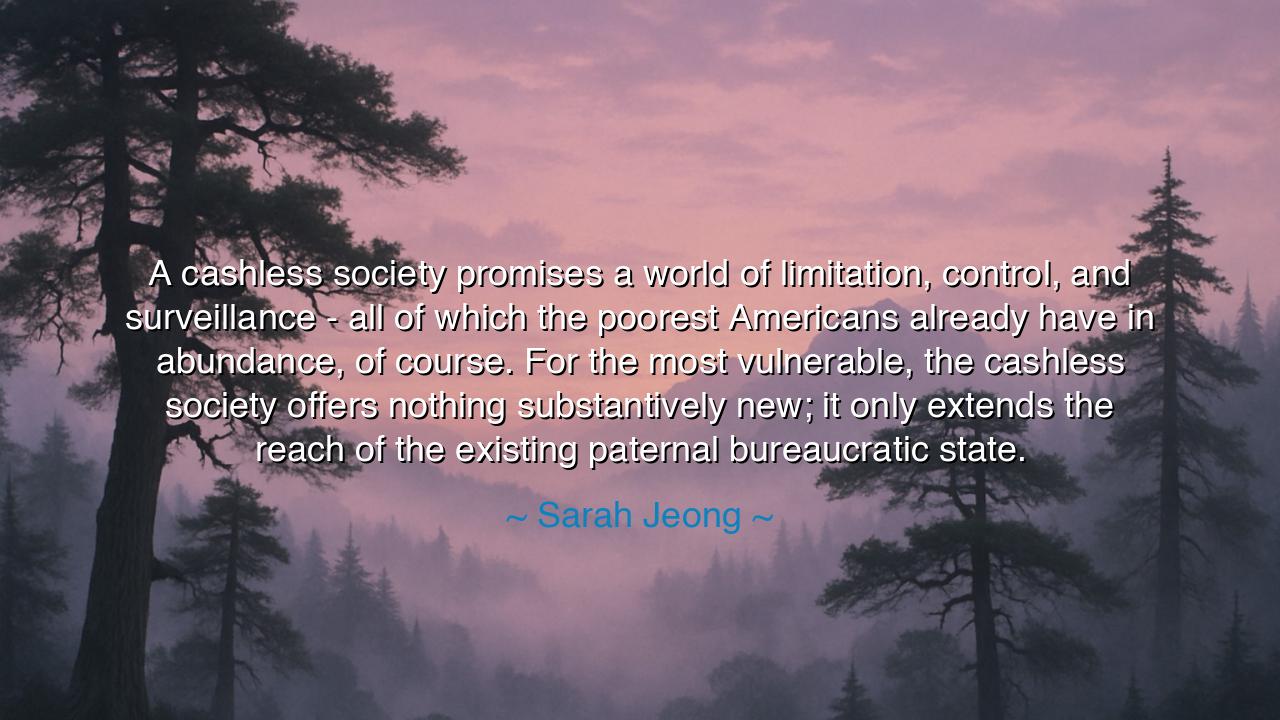
A cashless society promises a world of limitation, control, and
A cashless society promises a world of limitation, control, and surveillance - all of which the poorest Americans already have in abundance, of course. For the most vulnerable, the cashless society offers nothing substantively new; it only extends the reach of the existing paternal bureaucratic state.






Hear the voice of Sarah Jeong, sharp as a blade and sorrowful as prophecy: “A cashless society promises a world of limitation, control, and surveillance—all of which the poorest Americans already have in abundance, of course. For the most vulnerable, the cashless society offers nothing substantively new; it only extends the reach of the existing paternal bureaucratic state.” These words are not merely about coins and currency; they are about freedom, dignity, and the unseen chains that bind those with the least. For money in hand is not only an instrument of trade—it is a fragment of independence, a small shield against the gaze of power.
The origin of her warning lies in the age-old struggle between the powerful and the powerless. Wherever systems of control are built, it is always the poor who first feel their weight. To live without wealth is already to live under scrutiny—your movements tracked, your needs questioned, your worth measured in paperwork and signatures. For the wealthy, a cashless society might be convenience, a card waved or a phone tapped. But for the poor, it is yet another gatekeeper, another system where approval must be granted, another reminder that freedom is rationed to them in crumbs.
Consider the story of welfare in America. In many states, benefits are distributed not as cash but as electronic credits, restricted to certain purchases, and often subject to surveillance. Every transaction is recorded, every choice monitored. Those who receive assistance are treated not as citizens of dignity, but as children to be policed by the state. Already, they know the world Jeong describes—a world where control is constant and the right to privacy is denied. The move toward a cashless system does not invent new chains; it strengthens the old ones.
History too bears witness. Recall the company towns of the 19th century, where workers were often paid not in money but in “scrip,” tokens redeemable only at the company’s own stores. Wages became instruments of control, and laborers found themselves trapped in cycles of debt and dependency. Though the form was different, the principle was the same: to deny the poor true freedom by binding their means of exchange to the will of the powerful. What Jeong warns of is a modern return of that ancient bondage, disguised as progress.
The meaning of her words, then, is this: technology without justice deepens inequality. To strip away cash is not to liberate, but to bind, unless society first ensures that its systems serve all with fairness. A society that promises convenience for the wealthy but expands surveillance for the poor is not advancing, but regressing. It builds a shining tower for some, and deeper dungeons for others.
The lesson is clear and urgent: guard freedom not only in speech and law, but in the small, daily acts of life—how one buys bread, how one pays rent, how one chooses to give or save. Resist systems that demand total visibility of the poor while granting secrecy to the rich. Stand for policies that protect privacy, that provide options, that ensure no man or woman must beg permission for dignity. True progress is measured not in efficiency, but in compassion and fairness.
What then shall you do? Educate yourself about the systems that govern your money. Question whether convenience comes at the cost of freedom. Support those who seek to build alternatives—community banks, credit unions, technologies that empower rather than surveil. And most of all, listen to the voices of the vulnerable, for they are the first to feel the tightening chains and the first to know when liberty is under threat.
So remember Sarah Jeong’s warning. A cashless society, without justice, is not a promise of light but a shadow of deeper chains. Do not be lulled by ease, nor blinded by progress. For freedom is not found in the glitter of technology, but in the dignity of choice, the protection of privacy, and the steadfast defense of the most vulnerable. Only then can society call itself free.






AAdministratorAdministrator
Welcome, honored guests. Please leave a comment, we will respond soon